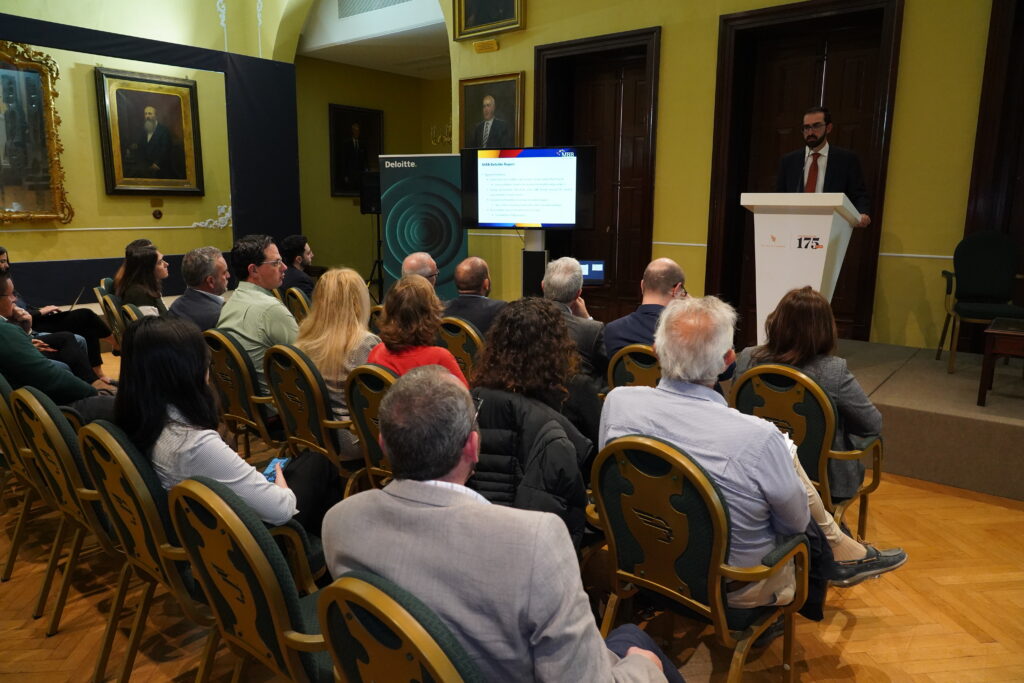Over 85% of the members are satisfied with the membership and would recommend The Malta Chamber to other businesses and professionals.
The Malta Chamber of Commerce, Enterprise and Industry held its Annual General Meeting (AGM) on Tuesday 28th March 2023. This AGM saw the end of a two-year term of office of President Marisa Xuereb while initiating The Malta Chamber Council elections to appoint 18 council members.
“Hand on heart, I feel that I have fulfilled my brief of seeing the renewal process of The Malta Chamber through, to such an extent that I believe that the energy that drives the organisation today gives it the required dynamism to aim higher for many years to come,” said President Marisa Xuereb in her opening speech. She added that The Malta Chamber’s model of governance is built on the principle of constant renewal through two-year terms of office that provide people with the impetus to get things done quickly while allowing for new energy and fresh ideas to come in every couple of years.
President Xuereb said that “The challenge for The Malta Chamber is to persevere through systematically pushing the priorities one by one over the course of the current legislation. I am confident we have the required credibility, a track record of transparency, integrity, accountability and consistency, and the right people on board to do this.”

Addressing those present, President Xuereb said “we stand on the shoulders of giants who have shaped the commercial, economic and social development of Malta leading a national business organisation that is unique in its legal status, history, influence and impact. I pass on the baton fully conscious of the honour and privilege I enjoyed in leading The Malta Chamber, satisfied that I have led with the required passion and conviction, and confident that The Malta Chamber will continue to be Malta’s leading business representative body.”
The Malta Chamber invited Minister for Finance and Employment, Clyde Caruana, to give an economic and financial update on the local and international scene. Minister Caruana spoke about the impact of high energy prices in Europe, the war in Ukraine, renewable energy and tax harmonisation. Minister Caruana said that for our country to continue to grow we need to focus more on talent, quality and greener initiatives to our economy. He said that “as a country, we are projecting a deficit that is lower than 5% but higher than 4% by end of year.” He added that the EU is pushing to increase energy prices for those who are still using fossil fuels and a major reform in tax harmonisation by end of 2025 and to start reining in fiscal deficits in 2024. Minister Caruana concluded that in the coming months the country will see an overhaul of the inland revenue department and stressed the importance for every entrepreneur to pay the taxes due.

Dr Marthese Portelli, The Malta Chamber CEO, outlined the work that has been done during the past year. Dr Portelli highlighted that over 85% of the members are satisfied with the membership and would recommend The Malta Chamber to other businesses and professionals. Dr Portelli gave an overview of the policy, projects and communications efforts and events that were held in the past year and the upcoming ones. “Our targets for the coming year will focus on prioritising the quality and member value for our members. All this will be accompanied by the continuous work and policy lobbying with government authorities, and European and international counterparts,” said The Malta Chamber CEO.

Towards the end of the AGM, Karen Spiteri Bailey, accountant at The Malta Chamber, presented the financial statements of The Malta Chamber for 2022. After her intervention, President Marisa Xuereb launched the electoral process for the council members to be elected. For this election, 21 candidates contested out of which four are female.

The Malta Chamber AGM was also addressed by Vladimír Dlouhý, President of Eurochambres and Fredrik Persson, President of BusinessEurope.
























